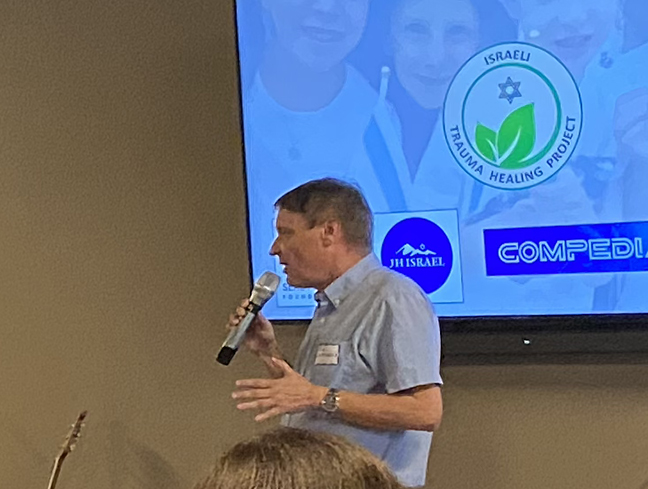Israeli entrepreneur visits Alabama to garner support for needed PTSD treatment innovation

Gil Ilutowich speaks to a group of Christian supporters of Israel in Birmingham on Sept. 26
According to the Israeli Center for Mental Health, around 70 percent of Israelis have mental issues such as anxiety or distress from the October 7 attack and subsequent war, and the Ministry of Defense estimates that 30 percent of wounded soldiers have some form of post-traumatic disorder.
With the incredible need for therapeutic solutions, Gil Ilutowich, founder and CEO of technology education company Compedia, was recently in Alabama to garner support for the Israeli Trauma Healing Project, which will provide scalable healing for Israeli soldiers, civilians and their families, using technology to provide post-trauma therapy on a wide scale, far beyond the country’s current capacity.
“The level of stress and post trauma now in Israel is horrific,” he said. “There aren’t enough therapists and psychiatrists in Israel.”
Don Carmichael, a Birmingham fundraising consultant, said “they can only involve so many people” on a one-to-one basis. “How can you provide something scalable that can really reach people on a large scale?”
Carmichael has worked with Ilutowich before, when Ilutowich was on the board of Yad Vashem and the museum was working on a new wing about the Righteous Among the Nations.
Ilutowich said that “the need is growing every day… I see it as an emergency situation.” Shortly after his Alabama visit, news broke of a woman who survived the Nova music festival massacre, but committed suicide on her 22nd birthday.
Ilutowich noted that the Israeli government is not focused on the issue because they are in the middle of trying to win a war. “They take care of people who are wounded… they know how to treat them,” he said. “The soul is something elusive.”
To help with this pressing need, and knowing that early intervention is critical, his team is looking to develop a PTSD assessment app that would evaluate the presence of PTSD, so the proper level of treatment can be planned.
Because assessments have typically been in person and the demand is great, immediate access is rare. Having a self-assessment app will give increased accessibility and convenience, “early detection of symptoms, and widespread use that can save lives by leading to early interventions.”
The project is partnering with the Master Life Coach Training Institute in Dallas. The institute’s CEO, Rodney Love, has known Ilutowich for years, and after Oct. 7, he contacted Ilutowich with the idea of using technology to assess trauma. “I thought I was going to have to sell him on the idea,” but Ilutowich “said let’s go. We’ve been let’s go-ing ever since.”
Love said “We’ll be able to reach out using the app and the assessment tool to see what the level of PTSD is with these men and women, and treat them where they are.”
After the assessment, the trauma project envisions three categories of assistance. The biggest part, which would reach the most people, is a digital solution through Hebrew-language technology, for “lighter kinds of trauma.”
For “heavier cases,” there would be in-person treatment with therapists, also with life coaches trained in this area.
The third category is experiential outdoor therapy, partnering with the Israel National Leadership Center in Ariel, which was developed by JH Israel in Birmingham.
The digital platform for hosting the content has already been developed by Ilutowich, at a cost of $3 million. The content itself comes mainly from the United States Navy’s SEAL Future Foundation, which Ilutowich said has “a lot of experience.”
He stated that more Navy SEALs killed themselves after coming back from Iraq than the number who were killed in active duty there. Upon returning to civilian life, many “couldn’t find themselves in society again.”
He added, “we can’t afford to let this happen in Israel.”
The SEAL Future Foundation developed tools and resources for successful transition back to the civilian world, and is donating its trauma treatment content “to help their brothers in arms in Israel.”
Compedia will translate the content into Hebrew and modify the content to an Israeli Jewish culture, and all content “will be Bible supported.” The content will be available on demand, accessible from rehabilitation centers and from home, and will incorporate digital activities and animation to encourage engagement and participation.
With the help of groups in Birmingham, Ilutowich is working to raise $380,000 for the first phase of the project. The first phase will fund the translation and digital conversion, and the rollout to soldiers. The first goal, developing the assessment app, is $50,000.
The next phases will adapt the program for youth, grade schools and kindergarteners, then the final phase will be full implementation of the program.
Ilutowich is willing to travel or speak remotely to any group or individual who wants to help the project become a reality, and is reaching out to the Jewish and Christian communities.
Compedia was founded in 1987, providing educational technology for companies like National Geographic, and educational games based on Bob the Builder, Casper and the Muppets. Their products are in over 40 languages with millions of users, and now use the latest AI and AR/VR technologies.
They also provide educational resources around SpaceIL, and were instrumental in the digital proliferation of iTaLAM, a Hebrew and Judaics curriculum used by Jewish Day Schools around the world.
Ilutowich said Compedia has previously been working with the Joint Distribution Committee, which allocates Federation-raised funds in Israel, on a project for children with autism, specifically about dealing with trauma among autistic children. He said those children are tied to a routine, and if you interrupt the routine, as happens during war, “it is a disaster,” so they worked with universities to develop a unit on how to deal with stress.
Compedia worked with the Yahalom Unit, a special operations unit of the IDF, creating 3-dimensional environments in virtual reality to simulate the Hamas tunnels the soldiers would encounter in Gaza, so they could train virtually, with avatars as virtual Hamas fighters.
They also created a simulation of the Hezbollah tunnels, which he said are “huge. Trucks can go there.”
Ilutowich said Hamas spent billions to construct a tunnel network for themselves while leaving Gaza civilians exposed, with the hope that Israel would wind up killing at least 200,000 people, so “the whole world would be against us.”
For Israeli soldiers, who meticulously warn civilians before launching operations, and who are fighting an enemy that dresses as civilians instead of being in uniform so they never know who might be trying to kill them, “their souls have been hurt by being in that situation.” Many have been in the field for 10 months.
As with so many in Israel, for Ilutowich this is not just a concept. Oct. 7 was supposed to be his son’s last day of service in the IDF, and he was supposed to pick him up on Oct. 8. His son did eventually come home — after being stabbed by a terrorist. He has since recovered.
His daughter was also called back to her elite unit, and Ilutowich said “the horrific things she saw made her so sick,” as the trauma manifests itself in physical sickness.
Ilutowich grew up around Holocaust survivors. “All my neighbors, all the people I knew were Holocaust survivors.” It wasn’t until he was older and visited Arizona, seeing old people joking around, that he realized that old people weren’t automatically sad. “As the son of Holocaust survivors, I have some of that trauma in me.”
He noted that one-third of the soldiers killed in the Yom Kippur War of 1973 were sons of Holocaust survivors.
He added, “I don’t want another generation of sad old people.”
With the war continuing, Ilutowich said he is “willing to devote my life to this, it is so important.”
More information: blessil.org



